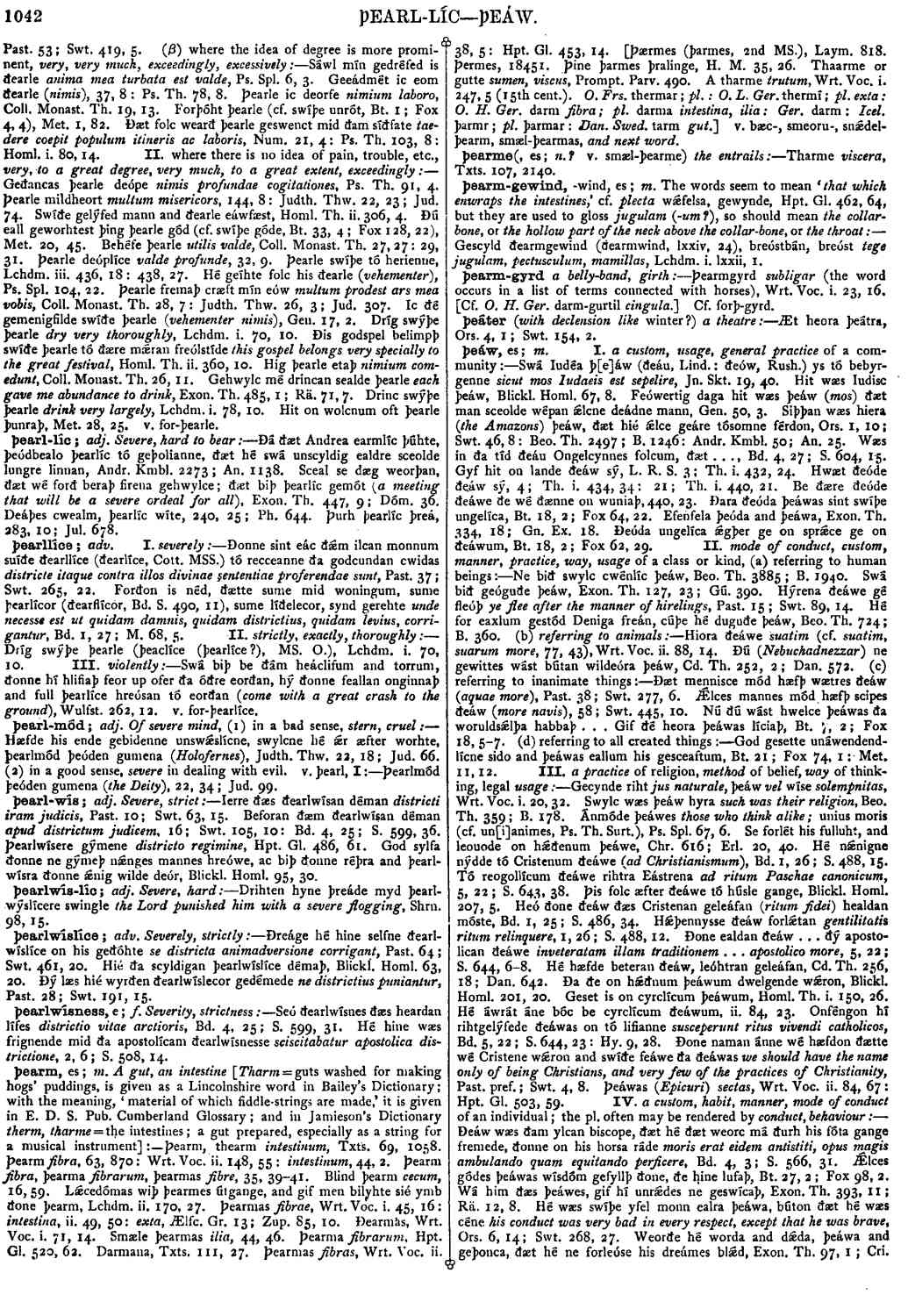þeáw
- noun [ masculine ]
-
Swá Iudéa þ[e]áw (ðeáu, Lind.: ðeów, Rush.) ys tó bebyrgenne
sicut mos Iudaeis est sepelire,
- Jn. Skt. 19, 40.
-
Hit wæs Iudisc þeáw,
- Blickl. Homl. 67, 8.
-
Feówertig daga hit wæs þeáw (
mos
) ðæt man sceolde wépan ǽlcne deádne mann,- Gen. 50, 3.
-
Siþþan wæs hiera (
the Amazons
) þeáw, ðæt hié ǽlce geáre tósomne férdon,- Ors. 1, 10; Swt. 46, 8: Beo. Th. 2497; B. 1246: Andr. Kmbl.
50; An. 25.
-
Wæs in ða tíd ðeáu Ongelcynnes folcum, ðæt...,
- Bd. 4, 27; S. 604, 15.
-
Gyf hit on lande ðeáw sý,
- L. R. S. 3; Th. i. 432, 24.
-
Hwæt ðeóde ðeáw sý,
- 4; Th. i. 434, 34: 21; Th. i. 440, 21.
-
Be ðære ðeóde ðeáwe ðe wé ðænne on wuniaþ,
- 440, 23.
-
Ðara ðeóda þeáwas sint swíþe ungelíca,
- Bt. 18, 2; Fox 64, 22.
-
Efenfela þeóda and þeáwa,
- Exon. Th. 334, 18; Gn. Ex. 18.
-
Ðeóda ungelíca ǽgþer ge on sprǽce ge on ðeáwum,
- Bt. 18, 2; Fox 62, 29.
-
Ne bið swylc cwénlíc þeáw,
- Beo. Th. 3885; B. 1940.
-
Swá bið geóguðe þeáw,
- Exon. Th. 127, 23; Gú. 390.
-
Hýrena deáwe gé fleóþ
ye flee after the manner of hirelings,
- Past. 15; Swt. 89, 14.
-
Hé for eaxlum gestód Deniga freán, cúþe hé duguðe þeáw,
- Beo. Th. 724; B. 360.
-
Hiora ðeáwe suatim (cf.
suatim, suarum more,
- 77, 43), Wrt. Voc. ii. 88, 14.
-
Ðú (
Nebuchadnezzar
) ne gewittes wast bútan wildeóra þeáw,- Cd. Th. 252, 2; Dan. 572.
-
Ðæt mennisce mód hæfþ wætres ðeáw (
aquae more
),- Past. 38; Swt. 277,
6.
-
Ǽlces mannes mód hæfþ scipes ðeáw (
more navis
),- 58; Swt. 445,
10.
-
Nú ðú wást hwelce þeáwas ða woruldsǽlþa habbaþ ... Gif ðé heora þeáwas líciaþ,
- Bt. 7, 2; Fox 18, 5-7.
-
God gesette unáwendendlícne sido and þeáwas eallum his gesceaftum,
- Bt. 21; Fox 74, 1: Met. 11, 12.
-
Gecynde riht jus naturale, þeáw vel wíse
solempnitas,
- Wrt. Voc. i. 20, 32.
-
Swylc wæs þeáw hyra
such was their religion,
- Beo. Th. 359; B. 178.
-
Ánmóde þeáwes
those who think alike;
unius moris (cf. un[i]animes, Ps. Th. Surt.), Ps. Spl. 67, 6. -
Se forlét his fulluht, and leouode on hǽðenum þeáwe,
- Chr. 616; Erl. 20, 40.
-
Hé nǽnigne nýdde tó Cristenum ðeáwe (
ad Christianismum
),- Bd. 1, 26; S.
488, 15.
-
Tó reogollícum ðeáwe rihtra Eástrena
ad ritum Paschae canonicum,
- 5, 22; S. 643, 38.
-
Þis folc after ðeáwe tó húsle gange,
- Blickl. Homl. 207, 5.
-
Heó ðone ðeáw ðæs Cristenan geleáfan (
ritum fidei
) healdan móste,- Bd. 1,
25; S. 486, 34.
-
Hǽþennysse ðeáw forlǽtan
gentilitatis ritum relinquere,
- 1, 26; S. 488, 12.
-
Ðone ealdan ðeáw ... ðý apostolican ðeáwe
inveteratam illam traditiortem ... apostolico more,
- 5, 22; S. 644, 6-8.
-
Hé hæfde beteran ðeáw, leóhtran geleáfan,
- Cd. Th. 256, 18; Dan. 642.
-
Ða ðe on hǽðnum þeáwum dwelgende wǽron,
- Blickl. Homl. 201, 20.
-
Geset is on cyrclícum þeáwum,
- Homl. Th. i. 150, 26.
- Hé áwrát áne bóc be cyrclícum ðeáwum, ii. 84, 23.
-
Onféngon hí rihtgelýfede ðeáwas on tó lifianne
susceperunt ritus vivendi catholicos,
- Bd. 5, 22; S. 644, 23: Hy. 9, 28.
-
Ðone naman ánne wé hæfdon ðætte wé Cristene wǽron and swíðe feáwe ða ðeáwas
we should have the name only of being Christians, and very few of the practices of Christianity,
- Past. pref; Swt. 4, 8.
-
Þeáwas
(Epicuri) sectas,
- Wrt. Voc. ii. 84, 67: Hpt. GlI. 503, 59.
-
Ðeáw wæs ðam ylcan biscope, ðæt hé ðæt weorc má ðurh his fóta gange fremede, ðonne on his horsa ráde
moris erat eidem antistiti, opus magiis ambulando quam equitando perficere,
- Bd. 4, 3; S. 566, 31.
-
Ǽlces gódes þeáwas wísdóm gefyllþ ðone, ðe hine lufaþ,
- Bt. 27, 2; Fox 98, 2.
-
Wá him ðæs þeáwes, gif hí unrǽdes ne geswícaþ,
- Exon. Th. 393, 11; Rä. 12, 8.
-
Hé wæs swíþe yfel monn ealra þeáwa, búton ðæt hé wæs céne
his conduct was very bad in every respect, except that he was brave,
- Ors. 6, 14; Swt. 268, 27.
-
Weorðe hé worda and dǽda, þeáwa and geþonca, ðæt hé ne forleóse his dreámes blǽd,
- Exon. Th. 97, 1; Cri.1584.
-
Ic geseó on eówres fæder þeáwum ðæt hé nys swá wel wið mé geworht, swá hé wæs gyrstandæg
I see by your father's behaviour that he is not so well disposed to me as he was yesterday,
- Gen. 31, 5.
-
Hé ongiet be sumum ðingum oððe ðeáwum útanne ætiéwdum eall ðæt hié innan ðenceaþ,
- Past. 21; Swt. 155, 10.
-
Wer gecorene on his ðeáwum
virum probum moribus,
- Bd. 3, 23; S. 554, 9.
-
Wæs hé swíðe geþungen on his ðeáwum
he was most excellent in his conduct,
- Blickl. Homl. 217, 7: Judth. Thw. 23, 19; Jud. 129: Exon. Th. 126, 10;
Gú. 369: 297, 14; Crä. 68.
-
Þeáwum geþancul
habitually thoughtful,
- Andr. Kmbl. 923; An. 462: Cd. Th. 102, 25; Gen. 1705.
-
Lifian rihtum þeáwum
to live righteously,
- 160, 4; Gen. 2646.
-
Þeáwum lifian
to live virtuously,
- Exon. Th. 319, 13; Víd. 11: Beo. Th. 4295; B. 2144.
-
Ǽlc ðara ðe healdan wile hálige þeáwas
every one who will maintain habits of holiness,
- Cd. Th. 92, 20; Gen. 1531.
Bosworth, Joseph. “þeáw.” In An Anglo-Saxon Dictionary Online, edited by Thomas Northcote Toller, Christ Sean, and Ondřej Tichy. Prague: Faculty of Arts, Charles University, 2014. https://bosworthtoller.com/31589.
Checked: 0